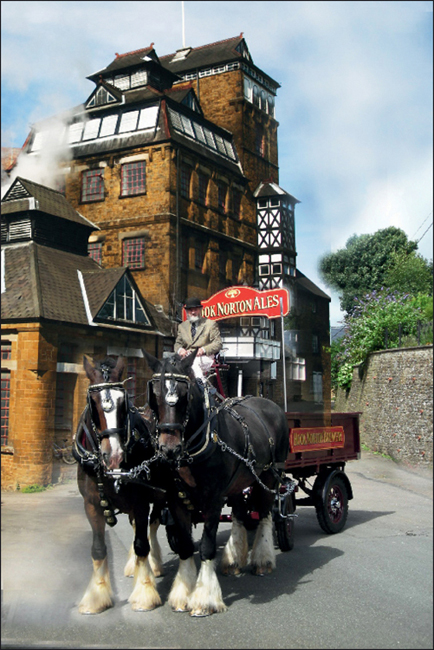There has been a renaissance in the use of local produce in reputable eating establishments throughout the Cotswolds. Add to this the growth of microbreweries and the region’s first vineyard, and food and drink continue to reach higher standards.
WHAT TO EXPECT
In recent years the Cotswolds has seen a proliferation of high-quality food in top-class restaurants, innovative pubs and traditional teashops. Indeed, teashops are a mainstay of the region and there are some exceptional ones – try Tisanes (for more information, click here) in Broadway or Badgers Hall (for more information, click here) in Chipping Campden. The emphasis is on seasonal, local food, showcased in a variety of ways, from traditional pub grub to Michelin-standard restaurant menus. Some places can be very expensive but establishments throughout the region serve tasty and unpretentious food at perfectly reasonable prices.
LOCAL PRODUCE
Many pubs and restaurants serve organically produced meat – Gloucester Old Spot pork is undergoing a revival and Prince Charles’s Highgrove estate is just one local source of organic beef, lamb and pork. Jesse Smith’s butcher’s shop (for more information, click here) in Cirencester also supplies first-class produce. Market gardening, particularly in the Vale of Evesham, has been an important part of the local economy for centuries, with festivals that take place in honour of certain vegetables and fruit.
Food Festivals
There are plenty of food festivals throughout the year; here are just a few to whet the appetite:
February – Bite Festival at Chipping Campden. Food fairs, farmers’ markets, chef demos and more.
June – Cheltenham Food and Drink Festival, which brings producers from across the country, plus local contributors and celebrity chefs; Asparafest in the Vale of Evesham, an extravaganza where asparagus is the star.
September – Stroud Food Festival – artisan produce at its best; Stratford-upon-Avon Food Festival – check out the Great Tastes Markets; Tetbury Food and Drink Festival, bringing together the best of Cotswold produce.

A traditional inn serving food and drink in the village of Broadway.
APA/Lydia Evans
Much of the local produce ends up in the excellent farmers’ markets held in the region. One of the best is at Stroud – the biggest market of its kind in the country, and named Best Farmers Market in the UK in 2013. There are between 45 and 60 stalls set up every Saturday (9am–2pm) offering organic, free range and locally produced food. In addition there are cooked foods to eat on site or take away. To find other markets, check www.cotswold.gov.uk.
The Cotswolds has a few regional speciality dishes. One is Gloucestershire Squab Pie – unlike squab pie from other regions that uses young pigeon, this one is made from lamb or mutton. Special recipe Tewkesbury mustard has been made there since the 17th century.
DAIRY PRODUCTS
You will find excellent dairy products in the Cotswolds, from home-made ice creams and yoghurts to local cheeses such as Single and Double Gloucester (produced since the 16th century) and North Cerney goat’s cheese. Other local artisan cheeses include the Cotswold versions of brie and cheddar. The Simon Weaver Cotswold Organic Dairy at Upper Slaughter produces three organic Cotswolds bries, plain, blue-veined and herb, all made using milk from their Friesian herd. Ice cream is lovingly made using organic milk in the Italian gelato style by The Cotswold Ice Cream Company. Winstones of Bownham, near Stroud, have been producing delicious ice cream since 1925 and also make frozen yoghurt and sorbets.
BEER, WINE AND SOFT DRINKS
There’s been a huge resurgence of small, independent breweries producing a wonderful and astoundingly diverse range of ales. However, there are some breweries that have been in business for years, such as the Donnington Brewery at Upper Sewell, where the Arkell family started brewing in 1865. The Hook Norton Brewery near Chipping Norton has been producing beer in the traditional method since 1849. The Stroud Brewery, in business for 250 years, moved to larger premises in 2011 enabling them to produce organic bottled beer. A recent artisan brewer is the Cotswold Lion Brewery (2012), at Coberley, producing three first-rate tipples, Shepherd’s Delight, Best in Show and Golden Fleece.

Cotswold brewery using Shire horses to deliver beer to local pubs.
Courtesy Hook Norton Brewery
In Dodington Ash, the Cotswold Spring Brewery uses natural spring water from the limestone plateau of the Cotswold Hills to produce its additive-free ale, while the Cotswold Spring Water Company, also in Dodington, bottles this same mineral water to sell to the public. For pure, non-alcoholic fruit juices one of the best in the region is Bensons of Sherborne. The Cotswolds’ first vineyard was planted at Poulton Hill near Cirencester in 2010, with the first wines due in 2014.
Find our recommended restaurants at the end of each tour.